|
|
|
Sort Order |
|
|
|
Items / Page
|
|
|
|
|
|
|
| Srl | Item |
| 1 |
ID:
174713
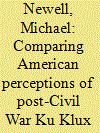

|
|
|
|
|
| Summary/Abstract |
Recently, public debates have questioned whether or not the American government responds differently to terrorism by white, right-wing, Americans. This article examines a historical period in which similar dynamics were on display in state responses to the Reconstruction-era Ku Klux Klan (KKK), Irish-American Fenians, and anarchists from 1860 to 1920. This history suggests that political officials responded to these groups more on the basis of ideas than their actual levels of violence, including discourses of Americanism shaped by ideology, nativism, and racism. Successful claims to ‘Americanism’ lent the KKK a sense of familiarity that led it to be seen as less of a threat to ontological security, even as it posed a significant threat of physical violence. In contrast, the ideologically subversive and foreign anarchists were responded to more severely, despite being responsible for far fewer deaths and injuries than the KKK. This history suggests that American counter-terrorism has been influenced by factors of racial and national belonging in the past, and provides significant context for the consideration of current debates about responses to right-wing groups.
|
|
|
|
|
|
|
|
|
|
|
|
|
|
|
|
| 2 |
ID:
183005
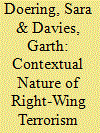

|
|
|
|
|
| Summary/Abstract |
Despite the growing threat of right-wing terrorism as a security concern in many countries, no empirical research has examined the variables that are associated with increases or decreases in right-wing terrorist incidents at a national level of aggregation. The present study examines the applicability of indicators informed by macro-level criminological theories related to immigration, economic conditions, and social demographic composition to the study of right-wing terrorism. A dataset of right-wing terrorist incidents in North America and Western Europe from 1990–2016 was created using secondary sources. Data on indicators related to socioeconomic conditions within countries were retrieved from the World Bank’s World Development Indicator database. The results show that indicators informed by criminological theory are less useful when the analyses are aggregated across countries, but provide more insight when examining relationships within individual countries. Future research should therefore take into consideration each country’s unique social, political, and economic contexts when studying terrorism at a national level.
|
|
|
|
|
|
|
|
|
|
|
|
|
|
|
|
| 3 |
ID:
178903
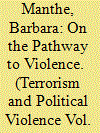

|
|
|
|
|
| Summary/Abstract |
West German society faced the emergence of a new calibre of right-wing terrorism in the 1970s. Right-wing terrorist groups evolved that showed themselves willing and able to commit violent attacks such as bombings and murder. This article explores the genesis and development of right-wing terrorism in West Germany between 1970 and 1980 while examining 22 identifiable groups and lone actors and taking into consideration the radicalization within the far right as well as the prevailing social conditions. West German right-wing terrorism until 1990 has remained a blind spot in historiography to this day. This article contributes to historical terrorism studies as well as to studies into the far right while applying historical-qualitative methods and interpreting primary sources. Using an approach informed by social history, this paper sheds new light on the individual participants, groups, and networks of right-wing terrorism as well as on its topics and targets. While taking into account a more dynamic definition of right-wing terrorism, this paper disengages from definitions that identify terrorism solely as a threat to the state itself. This makes possible a multidimensional approach employing contemporary history and studies in both terrorism and right-wing extremism.
|
|
|
|
|
|
|
|
|
|
|
|
|
|
|
|
| 4 |
ID:
163199
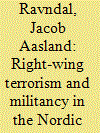

|
|
|
|
|
| Summary/Abstract |
Combining new quantitative and qualitative data, this article first describes and compares the evolution of right-wing terrorism and militancy in the Nordic countries between 1990 and 2015. Having established that Sweden has experienced considerably more right-wing terrorism and militancy than the other Nordic countries have, the article then seeks to account for Sweden’s outlier position. In doing so, the article draws on three concepts proposed by social movement research: organizational resources, political opportunities, and frame analysis. Applying these concepts to the Nordic countries, the study finds that Sweden’s outlier position may result from different WWII experiences, leaving Sweden with a stronger and more resilient extreme right movement, but also from receiving more immigrants while lacking influential anti-immigration (radical right) parties, and from conducting a more restrictive public debate on immigration, leaving little room for anti-immigration concerns in the public sphere. While the first two explanations are consistent with existing research, the third challenges the dominant view on how the public debate on immigration might influence extreme right mobilization and violence.
|
|
|
|
|
|
|
|
|
|
|
|
|
|
|
|
| 5 |
ID:
175717
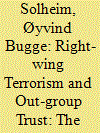

|
|
|
|
|
| Summary/Abstract |
Terrorist attacks often lead to public backlashes. Following the attacks on July 22, 2011 in Norway, Norwegians showed support for democratic values such as “openness,” “democracy,” and “tolerance” in the public debate and in the commemorations across the country. They also reported higher out-group trust. This paper explores two possible reasons for this increase in trust using a unique panel fielded before and right after the attacks. The first is that cognitive dissonance led people to dissociate from the terrorist and his ideology. The second is that the increase in trust was a response to the public backlash after the attacks. The increase in trust was not caused by cognitive dissonance. Rather, people who were already positive towards immigration, or who saw positive effects of the attacks, became more trusting than others did, and Progress Party supporters increased their trust less than others. These findings are interpreted as a response to the attacks and the political characteristics of the backlash. The study concludes by discussing implications for our understanding of the different consequences of attacks for the terrorists’ imagined constituencies and for the broader public.
|
|
|
|
|
|
|
|
|
|
|
|
|
|
|
|
| 6 |
ID:
190862
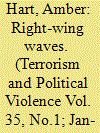

|
|
|
|
|
| Summary/Abstract |
The increasing global prominence of right-wing extremism and terrorism has been noted by scholars and government agencies alike. While right-wing terrorism has been documented throughout postwar history, groups have evolved, resulting in diverse materializations of violence perpetrated on behalf of varying ideologies and perceived threats. This paper draws upon Campion’s research into Australian right-wing extremism and terrorism, where three ideological threat narratives were identified. The aim of this research was to determine the applicability of Rapoport’s “wave” theory to the international evolution of extreme right-wing activity. In doing so, Campion’s framework is utilized and a case study analysis undertaken, investigating anti-communist, anti-immigration and anti-Islamic rhetoric on a transnational and transhisto-rical basis. It is argued that waves are found internationally, and that Rapoport’s model is therefore applicable to the right-wing milieu. The paper concludes that the extreme right is on the cusp of the next wave and discusses trends that may inform those in a position to counteract the forthcoming wave of activity. There remains a need for law enforcement and security agencies to monitor right-wing extremism and terrorism activity to remain attuned to the ever-evolving threat as the next wave manifests.
|
|
|
|
|
|
|
|
|
|
|
|
|
|
|
|
|
|
|
|
|